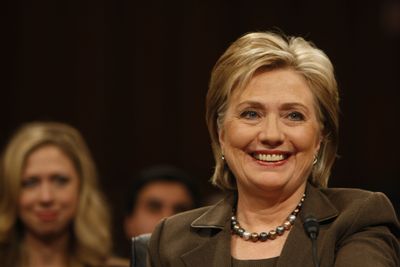In policy shift, U.S. will talk with Iran, Clinton says
Obama’s team to employ ‘tough and principled diplomacy’

WASHINGTON – Secretary of State-designate Hillary Rodham Clinton said Tuesday the Obama administration will seek to engage directly with Iran in an effort to persuade it to abandon its nuclear program and become “a constructive regional actor,” underscoring a dramatic shift in U.S. foreign policy from the Bush administration.
In prepared testimony and remarks during her confirmation hearing, Clinton was careful not to tip her hand on specific plans or policies. But she struck a theme of active engagement and unyielding diplomacy, a sharp contrast to President Bush’s policy of refusing to deal with countries that did not first meet conditions set by the United States.
“I don’t get up every morning thinking only about the threats and dangers we face,” Clinton said. “With every challenge comes an opportunity to find promise and possibility in the face of adversity and complexity.”
Clinton also pledged greater involvement in the quest for Middle East peace but was not drawn into specific questions about how the incoming administration might handle Israel’s invasion of the Gaza Strip.
But she drew the line at the idea of the United States engaging in immediate talks with Hamas, the militant group battling Israel. Clinton said it is appropriate to set conditions in dealing with what she called “non-state actors,” which in the case of Hamas means renouncing violence, recognizing Israel, and respecting previous agreements between Israelis and Palestinians.
The 61-year-old former first lady and current senator from New York was warmly embraced by senators on both sides of the aisle who praised her intellect and her policy-making skills. She fielded nearly six hours of mostly polite queries, the only exceptions being a few questions about potential conflicts posed by President Clinton’s charitable foundation.
The committee plans to vote on her nomination Thursday morning, and she is expected to be confirmed easily.
Clinton’s daughter, Chelsea, sat behind her during the hearing, but the former president watched the hearings on television with his wife’s 89-year-old mother, Dorothy Rodham, a spokesman said.
During his second term, Bush began a shift in policy, opening up dialogue with North Korea and bending on his initial demands for conditions on talks with Iran, but the idea that Bush had little interest in diplomatic engagement persisted in most foreign capitals.
On Iran, the Bush administration has pursued a carefully calibrated effort that held out the prospect of economic and political incentives if Iran agreed to suspend its efforts to enrich uranium, a key component of nuclear weapons. Bush permitted ambassador-level diplomats to meet with Iranian counterparts but insisted that more substantive discussions not occur unless Iran first changed its behavior.
Clinton said flatly Tuesday that Bush’s effort has “not worked,” and that the Obama team is “very open to looking to a positive, effective way of engaging with Iran.” She acknowledged that the effort represents a gamble, and insisted that a nuclear-armed Iran is unacceptable to Obama, but added, “We won’t know what we’re capable of achieving until we’re actually there working on it.”
Her remarks Tuesday were supplemented by 79 pages of formal answers to questions posed by the Senate Foreign Relations Committee. In her written responses to the committee’s questions, Clinton said that it is even possible that Obama could meet directly with Iranian leaders, a prospect she had ridiculed when she was Obama’s rival in the bruising Democratic primaries.
“We will not sit down for the sake of talking,” Clinton wrote. “But we are willing to lead tough and principled diplomacy with the appropriate Iranian leader at the time and place of our choosing – if and only if – it can advance the interest of the United States.”
Condoleezza Rice, the outgoing secretary of state, defended the administration’s approach to Iran in an interview with the Washington Post on Monday, arguing that it had put Iran on the defensive in the region.
“This isn’t an issue of talk to Iranians, don’t talk to Iranians,” Rice said. “It is a question of what price the Iranians are trying to extract for engagement. Are they trying to extract a grand bargain in which Iran is acknowledged as a regional power without having given up the very policies that are destabilizing the region?”